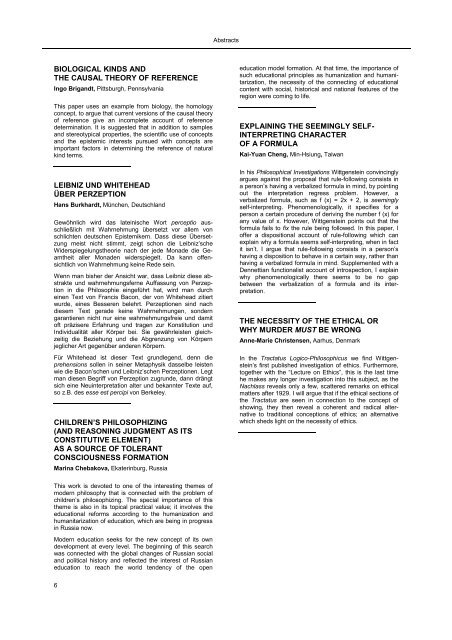Erfahrung und Analyse Experience and Analysis - Austrian Ludwig ...
Erfahrung und Analyse Experience and Analysis - Austrian Ludwig ...
Erfahrung und Analyse Experience and Analysis - Austrian Ludwig ...
You also want an ePaper? Increase the reach of your titles
YUMPU automatically turns print PDFs into web optimized ePapers that Google loves.
BIOLOGICAL KINDS AND<br />
THE CAUSAL THEORY OF REFERENCE<br />
Ingo Brig<strong>and</strong>t, Pittsburgh, Pennsylvania<br />
This paper uses an example from biology, the homology<br />
concept, to argue that current versions of the causal theory<br />
of reference give an incomplete account of reference<br />
determination. It is suggested that in addition to samples<br />
<strong>and</strong> stereotypical properties, the scientific use of concepts<br />
<strong>and</strong> the epistemic interests pursued with concepts are<br />
important factors in determining the reference of natural<br />
kind terms.<br />
LEIBNIZ UND WHITEHEAD<br />
ÜBER PERZEPTION<br />
Hans Burkhardt, München, Deutschl<strong>and</strong><br />
Gewöhnlich wird das lateinische Wort perceptio ausschließlich<br />
mit Wahrnehmung übersetzt vor allem von<br />
schlichten deutschen Epistemikern. Dass diese Übersetzung<br />
meist nicht stimmt, zeigt schon die Leibniz’sche<br />
Widerspiegelungstheorie nach der jede Monade die Geamtheit<br />
aller Monaden widerspiegelt. Da kann offensichtlich<br />
von Wahrnehmung keine Rede sein.<br />
Wenn man bisher der Ansicht war, dass Leibniz diese abstrakte<br />
<strong>und</strong> wahrnehmungsferne Auffassung von Perzeption<br />
in die Philosophie eingeführt hat, wird man durch<br />
einen Text von Francis Bacon, der von Whitehead zitiert<br />
wurde, eines Besseren belehrt. Perzeptionen sind nach<br />
diesem Text gerade keine Wahrnehmungen, sondern<br />
garantieren nicht nur eine wahrnehmungsfreie <strong>und</strong> damit<br />
oft präzisere <strong>Erfahrung</strong> <strong>und</strong> tragen zur Konstitution <strong>und</strong><br />
Individualität aller Körper bei. Sie gewährleisten gleichzeitig<br />
die Beziehung <strong>und</strong> die Abgrenzung von Körpern<br />
jeglicher Art gegenüber <strong>and</strong>eren Körpern.<br />
Für Whitehead ist dieser Text gr<strong>und</strong>legend, denn die<br />
prehensions sollen in seiner Metaphysik dasselbe leisten<br />
wie die Bacon’schen <strong>und</strong> Leibniz’schen Perzeptionen. Legt<br />
man diesen Begriff von Perzeption zugr<strong>und</strong>e, dann drängt<br />
sich eine Neuinterpretation alter <strong>und</strong> bekannter Texte auf,<br />
so z.B. des esse est percipi von Berkeley.<br />
CHILDREN’S PHILOSOPHIZING<br />
(AND REASONING JUDGMENT AS ITS<br />
CONSTITUTIVE ELEMENT)<br />
AS A SOURCE OF TOLERANT<br />
CONSCIOUSNESS FORMATION<br />
Marina Chebakova, Ekaterinburg, Russia<br />
This work is devoted to one of the interesting themes of<br />
modern philosophy that is connected with the problem of<br />
children’s philosophizing. The special importance of this<br />
theme is also in its topical practical value; it involves the<br />
educational reforms according to the humanization <strong>and</strong><br />
humanitarization of education, which are being in progress<br />
in Russia now.<br />
Modern education seeks for the new concept of its own<br />
development at every level. The beginning of this search<br />
was connected with the global changes of Russian social<br />
<strong>and</strong> political history <strong>and</strong> reflected the interest of Russian<br />
education to reach the world tendency of the open<br />
6<br />
Abstracts<br />
education model formation. At that time, the importance of<br />
such educational principles as humanization <strong>and</strong> humanitarization,<br />
the necessity of the connecting of educational<br />
content with social, historical <strong>and</strong> national features of the<br />
region were coming to life.<br />
EXPLAINING THE SEEMINGLY SELF-<br />
INTERPRETING CHARACTER<br />
OF A FORMULA<br />
Kai-Yuan Cheng, Min-Hsiung, Taiwan<br />
In his Philosophical Investigations Wittgenstein convincingly<br />
argues against the proposal that rule-following consists in<br />
a person’s having a verbalized formula in mind, by pointing<br />
out the interpretation regress problem. However, a<br />
verbalized formula, such as f (x) = 2x + 2, is seemingly<br />
self-interpreting. Phenomenologically, it specifies for a<br />
person a certain procedure of deriving the number f (x) for<br />
any value of x. However, Wittgenstein points out that the<br />
formula fails to fix the rule being followed. In this paper, I<br />
offer a dispositional account of rule-following which can<br />
explain why a formula seems self-interpreting, when in fact<br />
it isn’t. I argue that rule-following consists in a person’s<br />
having a disposition to behave in a certain way, rather than<br />
having a verbalized formula in mind. Supplemented with a<br />
Dennettian functionalist account of introspection, I explain<br />
why phenomenologically there seems to be no gap<br />
between the verbalization of a formula <strong>and</strong> its interpretation.<br />
THE NECESSITY OF THE ETHICAL OR<br />
WHY MURDER MUST BE WRONG<br />
Anne-Marie Christensen, Aarhus, Denmark<br />
In the Tractatus Logico-Philosophicus we find Wittgenstein’s<br />
first published investigation of ethics. Furthermore,<br />
together with the “Lecture on Ethics”, this is the last time<br />
he makes any longer investigation into this subject, as the<br />
Nachlass reveals only a few, scattered remarks on ethical<br />
matters after 1929. I will argue that if the ethical sections of<br />
the Tractatus are seen in connection to the concept of<br />
showing, they then reveal a coherent <strong>and</strong> radical alternative<br />
to traditional conceptions of ethics; an alternative<br />
which sheds light on the necessity of ethics.












